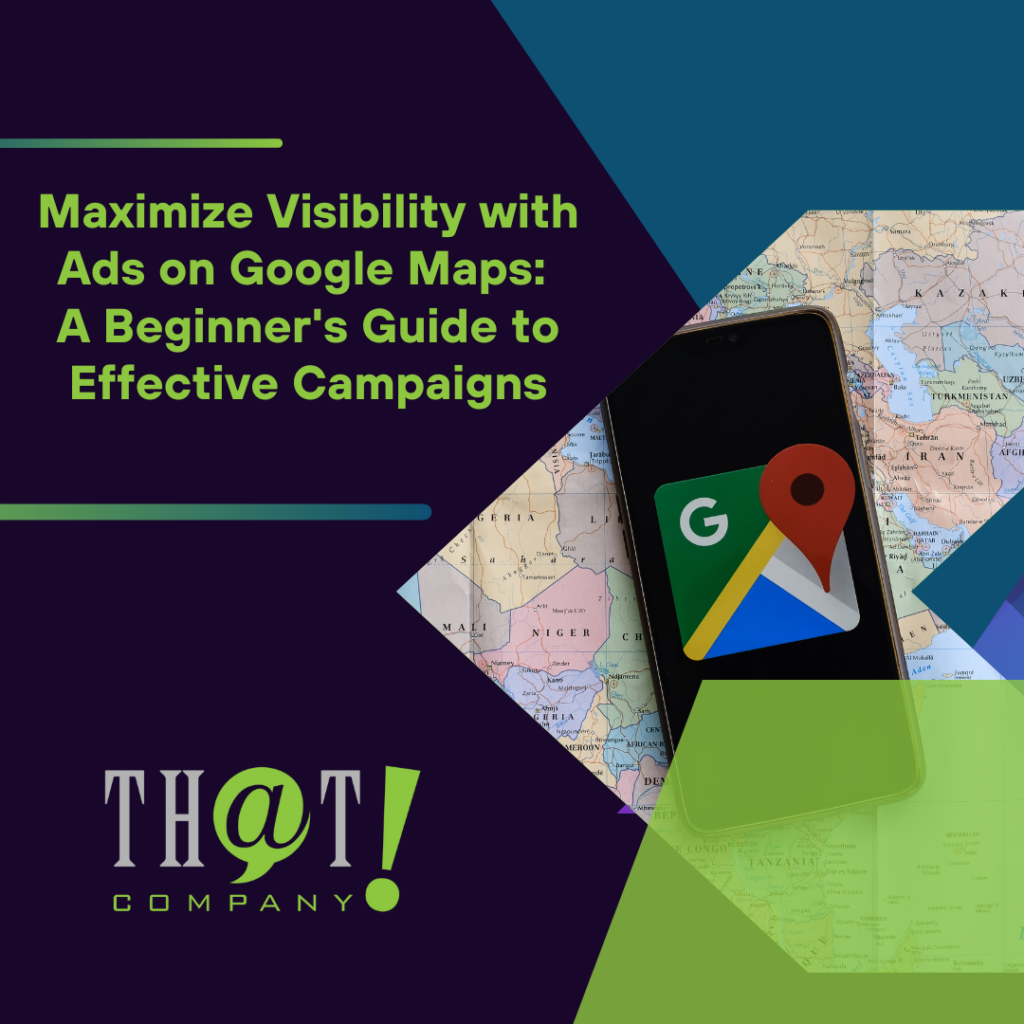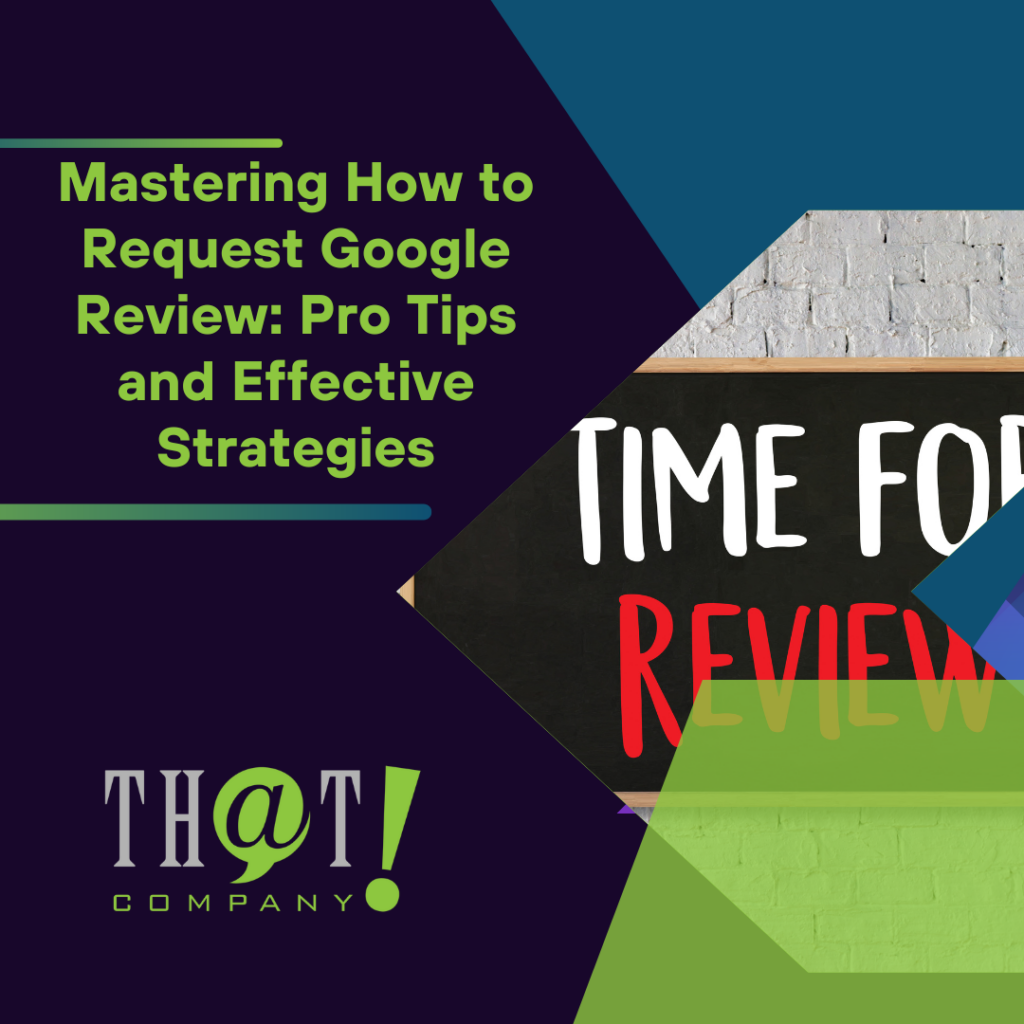
Need to boost your online presence? A digital marketing strategy is key. In this guide, you’ll learn how to create an effective plan to reach your business goals using digital channels.
Key Insights
- A comprehensive digital marketing strategy integrates both online and offline activities, ensuring alignment with overall business objectives and facilitating measurable outcomes.
- Key components of an effective digital marketing strategy include setting S.M.A.R.T. goals, understanding the target audience, budgeting, and utilizing multiple marketing tactics like SEO, PPC, and content marketing.
- Emerging trends such as AI automation and voice search optimization are shaping the future of digital marketing, requiring businesses to remain adaptable and innovative to stay competitive.

Understanding Digital Marketing Strategy
A digital marketing strategy is a structured plan for using digital channels to achieve marketing goals. It integrates both digital and offline marketing activities to support overall business objectives, ensuring that all marketing efforts are cohesive and aligned with the broader goals of the business. Without a solid strategy, marketing activities can become fragmented, leading to inefficiencies and missed opportunities.
Aligning elements in a digital marketing strategy helps avoid isolated efforts and ensures every activity contributes to the bigger picture. This layered approach provides cohesiveness toward business objectives, making it easier to track progress and make necessary adjustments.
The core purpose of a digital marketing campaign goes beyond organizing product promotions; it aims to stay aligned with the overarching business purpose.
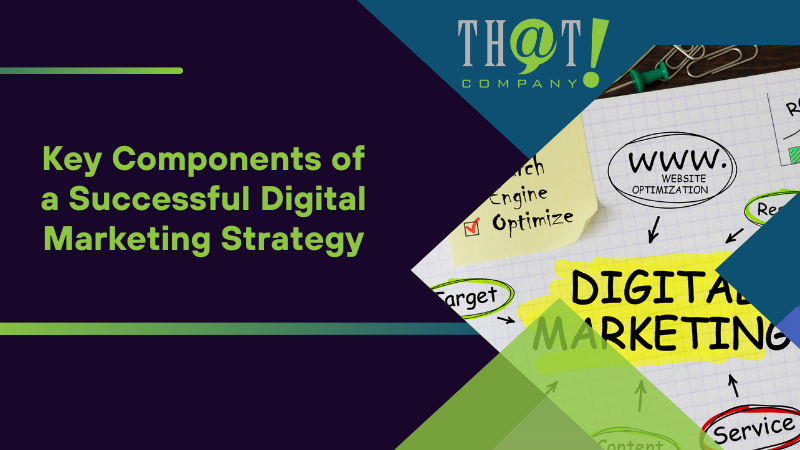
Key Components of a Successful Digital Marketing Strategy
Creating an effective digital marketing strategy involves several key components:
- Setting clear goals
- Understanding your audience
- Budgeting
- Performance metrics
These components ensure that your marketing efforts are targeted and measurable, leading to better outcomes.
A successful digital marketing strategy also includes various tactics such as online marketing strategies:
- SEO
- PPC
- Content marketing
- Social media marketing
- Email marketing
By integrating these elements, you can create a comprehensive approach that leverages multiple channels and methods to reach your target audience effectively.
Now, let’s delve deeper into each of these components, beginning with setting clear goals and objectives.
Setting Clear Goals and Objectives
Setting clear goals and objectives is crucial for any marketing strategy. S.M.A.R.T. goals—Specific, Measurable, Achievable, Relevant, and Time-bound—provide a clear framework for setting objectives that are aligned with broader business objectives. These goals help track progress, make necessary adjustments, and ultimately achieve desired outcomes.
Clear marketing objectives ensure your strategy supports overall business goals. This alignment helps create a cohesive approach where each marketing activity contributes to the bigger picture, enabling you to measure success effectively and make data-driven decisions.
Identifying Your Target Audience
Identifying your target audience is a fundamental step in crafting an effective digital marketing strategy. Creating detailed buyer personas, which include demographics and psychographics, helps tailor your marketing efforts to resonate with your ideal customers. Factors to consider when defining your target audience include interests, needs, and behaviors.
Data sources such as Google Analytics, social media insights, and customer surveys can provide valuable information for creating accurate buyer personas. Understanding your audience helps craft compelling marketing messages that drive engagement and generate leads.
Choosing the Right Digital Channels
Choosing the right digital channels is essential for reaching your target audience effectively. Focus on channels that provide the best ROI and align with your audience’s activity. For example, LinkedIn is suitable for targeting professionals, while Instagram and Pinterest work well for visually-driven products.
Combining PPC with SEO efforts can enhance the overall effectiveness of your digital marketing strategy. Selecting the right digital channels maximizes reach and engagement, ensuring efficient and effective marketing efforts.

Key Benefits of Using That! Company’s White Label Digital Marketing Services
Leveraging That! Company’s white label digital marketing services offers a multitude of advantages for businesses seeking to enhance their marketing efforts without the substantial investment of building an in-house team. By partnering with a trusted provider, businesses can access a wide range of digital marketing strategies and tactics, such as SEO, PPC, content marketing, and social media marketing, all under their brand name. This approach not only expands service offerings but also allows companies to focus on their core competencies while experts handle the technical aspects of digital marketing.
One of the key benefits is the ability to scale operations efficiently. As market demands fluctuate, businesses can adjust their marketing efforts without the overhead costs of hiring additional staff or investing in new technologies. This flexibility ensures that marketing strategies are aligned with business goals and can be adapted quickly to changing market conditions.
Moreover, using white label services enhances brand credibility and client satisfaction. By delivering high-quality digital marketing solutions, businesses can build stronger relationships with their clients, leading to increased loyalty and repeat business. The expertise and resources provided by That! Company enable businesses to stay competitive in the digital landscape, offering innovative solutions that drive engagement and conversions.
That! Company delivers comprehensive multi-channel internet marketing services, ensuring your clients achieve maximum online visibility and engagement. Their services include search engine optimization, pay-per-click advertising, social media management, and reputation management, all designed to improve conversion rates and overall return on investment. Leveraging their expertise enables businesses to achieve higher engagement, flexibility, and improved conversion rates.
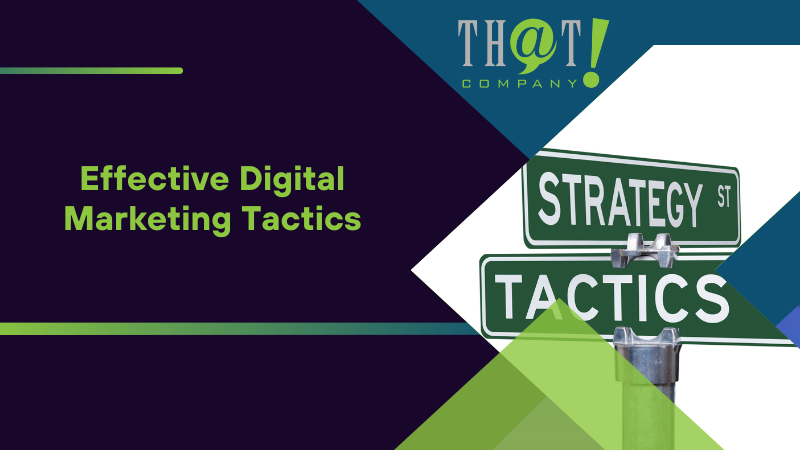
Effective Digital Marketing Tactics
Effective digital marketing tactics are essential for a successful strategy. These tactics include:
- Content marketing
- SEO
- Email marketing
- PPC advertising
- Social media marketing
- Influencer marketing
Each tactic plays a crucial role in reaching and engaging your target audience.
For small businesses, content marketing, local SEO, and social media marketing are particularly effective. A multifaceted approach allows businesses to create a comprehensive digital marketing strategy that leverages various channels and methods to achieve their marketing goals.
In the following sections, we will explore each of these tactics in detail.
Content Marketing
Content marketing involves creating and sharing various types of content, such as blogs, videos, and webinars, to engage your audience. Effective content marketing not only drives traffic but also enhances brand visibility and authority. The goals of content marketing include driving engagement, building trust, and positioning your brand as an expert in your field.
Data-driven insights allow you to tailor your content strategy to specific consumer segments, enhancing engagement and effectiveness. Utilizing different content formats and focusing on quality helps create a successful content marketing strategy that resonates with the audience.
Social Media Marketing
Social media marketing is a powerful tool for building brand awareness and engaging with your audience. The main purpose of social media marketing is to promote your business, increase brand awareness, and foster engagement. Common platforms include Facebook, Instagram, and LinkedIn, each offering unique opportunities to reach different audience segments.
Engagement on social media can be enhanced by responding to comments, asking questions, and creating interactive content. Utilizing real-time content and social listening can further improve your social media strategy, helping you connect with your audience on a deeper level.
Search Engine Optimization (SEO)
Search Engine Optimization (SEO) aims to improve website ranking and visibility in search engine results, driving more organic traffic to your site. Key practices for optimizing content with SEO include incorporating relevant keywords, creating high-quality backlinks, and ensuring mobile-friendliness.
Regular updates to content are crucial for maintaining an effective SEO strategy, as they help adapt to changing algorithms. Off-page SEO tactics, such as building quality backlinks, also play a significant role in enhancing authority and rankings.
Pay-Per-Click (PPC) Advertising
Pay-Per-Click (PPC) advertising is a method of generating leads by placing ads in search engines and social media, paying per click. The objective is to drive targeted traffic to your website, with costs incurred per click. Success factors include targeting high-performing keywords, monitoring ad performance, and utilizing A/B testing to improve ad effectiveness.
Platforms such as Google Ads, Facebook Ads, and LinkedIn Ads are popular for running PPC campaigns. Balancing paid and organic efforts enhances the overall marketing strategy, leading to better results.

Need Help? Use That! Company the White Label Agency Leading Agencies Use
That! Company has been providing white label digital marketing services since 2007, making it a well-established partner for agencies. White label marketing enables companies to offer a broader range of services without investing heavily in developing those services themselves. This approach allows businesses to scale operations efficiently by accessing a larger pool of expertise.
Partnering with a white label agency like That! Company helps businesses save on recruiting costs and leverage advanced technologies without developing them internally. This collaboration ensures that marketing tasks are handled by experts, adapting to evolving practices in areas like SEO and PPC.

Implementing and Managing Your Digital Marketing Plan
Implementing and managing a digital marketing plan involves several key steps. The first step is defining your business goals and conducting a digital audit to identify strengths and areas for improvement. This audit helps assess current results and campaigns, linking digital marketing channels and assets to organizational goals.
Once the audit is complete, the next steps involve developing a content strategy and monitoring performance metrics. Diversifying your approach and strategically allocating resources helps implement a comprehensive digital marketing plan that drives results.
In the following subsections, we will explore these steps in more detail.
Conducting a Digital Audit
A digital audit is essential for identifying strengths and areas for improvement in your current marketing activities. This process involves assessing current results and campaigns, documenting relevant content, and linking digital marketing channels to organizational goals.
Conducting a digital audit also includes reviewing social media profiles to measure engagement and traffic generation, as well as performing competitor analysis to identify areas of opportunity. This comprehensive evaluation helps create a solid foundation for your digital marketing strategy.
Developing a Content Strategy
Developing a content strategy involves aligning your content with audience and business goals. Planning how to create, deliver, and manage content using tools like Trello or Asana can streamline your efforts. Researching long-tail keywords and using various content formats, such as blogs, videos, and podcasts, can enhance your content strategy.
Listening to audience feedback on social media is essential for effective engagement and content creation. Generative AI can also improve content workflows by facilitating steps like topic identification and draft creation.
Repurposing content maximizes reach and enhances engagement, making your content strategy more effective.
Monitoring and Analyzing Performance
Monitoring and analyzing performance is crucial for ensuring your digital marketing strategy remains aligned with business objectives. Regularly tracking performance metrics, such as click-through rates and conversion rates, helps make informed decisions that improve campaign performance.
Tools like Google Analytics, Google Search Console, and Google Ads are essential for monitoring digital marketing strategies. By conducting A/B tests and identifying trends, you can optimize your campaigns for better performance. Regular reviews and adjustments ensure that your marketing activities stay effective and responsive to changes in the digital landscape.

Case Studies of Successful Digital Marketing Strategies
Real-world examples of successful digital marketing strategies can serve as inspiration and provide valuable insights for your own digital marketing campaigns. Case studies of well-known brands like Nike and Coca-Cola illustrate the impact of well-executed digital marketing strategies and the tactics that led to their success.
In the following subsections, we will explore Nike’s integrated digital marketing campaigns and Coca-Cola’s personalized marketing efforts. These case studies highlight the importance of emotional storytelling, influencer partnerships, and data-driven marketing strategies in achieving remarkable results.
Nike’s Integrated Digital Campaigns
Nike’s marketing strategy is a prime example of how emotional storytelling and influencer partnerships can create powerful narratives that resonate with consumers. The ‘Dream Crazier’ campaign, which celebrated female athletes, effectively used social media, video content, and influencer partnerships to engage customers and create a lasting impact.
Through these integrated strategies, Nike successfully drives customer engagement and boosts sales. The combination of real-time content and strategic influencer collaborations has helped Nike build a strong brand presence and connect with its audience on a deeper level.
Coca-Cola’s Personalization at Scale
Coca-Cola’s digital marketing strategy focuses on personalized marketing and user-generated content. The ‘Share a Coke’ campaign is a perfect example of this approach, where Coca-Cola replaced its iconic logo with popular names to create a personal connection with consumers.
By using data analytics to target specific markets, Coca-Cola optimized its campaign and encouraged engagement, resulting in a viral movement that connected customers to the product. This focus on personalization has helped Coca-Cola foster stronger emotional connections with consumers and enhance brand loyalty.
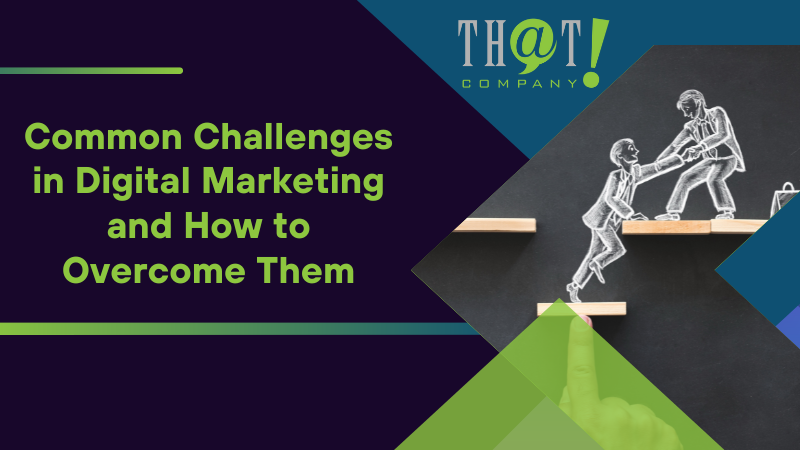
Common Challenges in Digital Marketing and How to Overcome Them
Digital marketers often face common challenges such as oversaturation of content, ad fatigue, algorithm changes, and significant upfront investment of time and resources. Overcoming these challenges requires staying informed, being adaptable, and continuously refining strategies to keep pace with the evolving digital landscape.
In the following subsections, we will discuss how to adapt to changing algorithms and ensure data privacy compliance. These insights will help you navigate the complexities of digital marketing and maintain effective strategies that drive results.
Adapting to Changing Algorithms
Changes in algorithms can significantly impact a brand’s online visibility and engagement, requiring marketers to stay informed and adapt their strategies. Continuously evolving strategies and staying updated with the latest algorithm changes help marketers maintain effective digital strategies that drive results.
Staying agile and responsive to algorithm updates ensures that your digital marketing efforts remain effective and aligned with platform requirements. This adaptability is crucial for maintaining visibility and engagement in the ever-changing digital landscape.
Ensuring Data Privacy Compliance
Adhering to data privacy regulations is crucial for businesses, especially as concerns around data protection grow. Understanding and complying with data privacy laws like GDPR and CCPA is essential for maintaining consumer trust and avoiding legal penalties.
Implementing best practices for data protection can help businesses comply with evolving data privacy laws. This includes being transparent about data collection practices, obtaining explicit consent from users, and ensuring robust security measures to protect consumer data.

Future Trends in Digital Marketing
Emerging trends in digital marketing involve leveraging new technologies to enhance marketing strategies. Artificial intelligence (AI) and voice search optimization are two key trends that are transforming the digital marketing landscape.
In the following subsections, we will explore the role of AI and automation in digital marketing and discuss the importance of optimizing for voice search. These trends highlight the need for businesses to stay ahead of the curve and continuously innovate their marketing strategies.
Artificial Intelligence and Automation
Artificial Intelligence (AI) in marketing refers to the use of technology to simulate human intelligence processes, enhancing decision-making and strategy formulation. AI and automation tools significantly streamline marketing tasks, allowing marketers to focus on strategic initiatives rather than routine tasks.
Automating regular marketing activities such as email campaigns and social media posting improves overall efficiency and reduces human error. Personalization is greatly enhanced by AI, which can analyze customer data and behavior to deliver customized content and experiences to users.
Voice Search Optimization
Voice search accounts for a significant portion of all searches, highlighting the need for businesses to adapt their SEO strategies. Optimizing for voice search requires a focus on natural language and conversational queries to meet user expectations.
The goal of voice search optimization is to earn the featured snippet or position zero in search results. By adjusting their SEO strategies to accommodate the natural language used in voice queries, businesses can improve their visibility and engagement in voice search results.
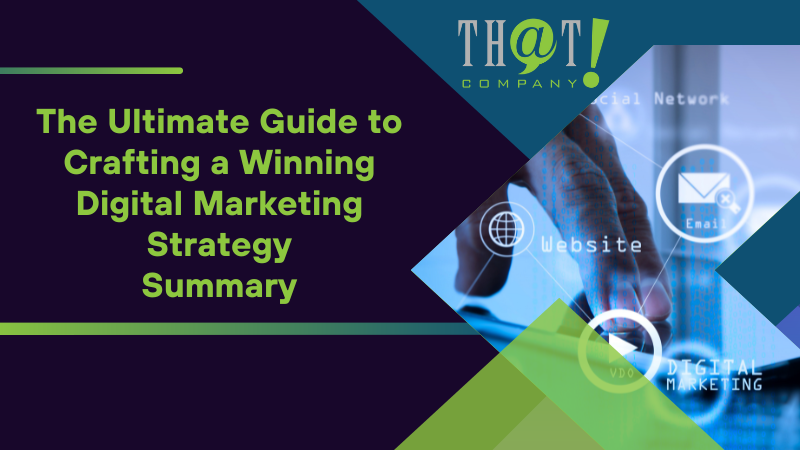
Summary
In summary, crafting a winning digital marketing strategy involves understanding key components such as setting clear goals, identifying your target audience, and choosing the right digital channels. Implementing effective digital marketing tactics, such as content marketing, social media marketing, SEO, and PPC advertising, can significantly enhance your marketing efforts and drive better results.
As we look to the future, staying informed about emerging trends like AI and voice search optimization will be crucial for maintaining a competitive edge. By continuously refining your strategies and adapting to changes in the digital landscape, you can achieve long-term success and drive meaningful engagement with your audience.

Frequently Asked Questions
What are the key components of a successful digital marketing strategy?
A successful digital marketing strategy hinges on setting clear goals and understanding your audience, while effectively budgeting and leveraging performance metrics. Additionally, selecting appropriate digital channels such as SEO, PPC, content marketing, social media, and email marketing is essential.
How can I identify my target audience?
To identify your target audience, create detailed buyer personas utilizing demographics and psychographics, and leverage data from Google Analytics, social media insights, and customer surveys. This approach will enable you to tailor your marketing efforts more effectively.
What are the benefits of using That! Company’s digital marketing services?
Utilizing That! Company’s digital marketing services ensures enhanced online visibility and engagement through their comprehensive offerings, including white label SEO, PPC, and social media management. Moreover, their cost-effective solutions provide measurable results and enable precise audience targeting.
How do I choose the right digital channels for my marketing strategy?
To choose the right digital channels for your marketing strategy, prioritize those that demonstrate the best return on investment and resonate with your target audience’s preferences. It is essential to leverage platforms like LinkedIn for professional engagement and Instagram for visual appeal, while also integrating PPC and SEO for greater impact.
What are some common challenges in digital marketing and how can they be overcome?
Digital marketing faces challenges such as content oversaturation, ad fatigue, and algorithm changes. To effectively overcome these obstacles, it is essential to stay informed, adapt strategies accordingly, and continuously refine marketing efforts.



















